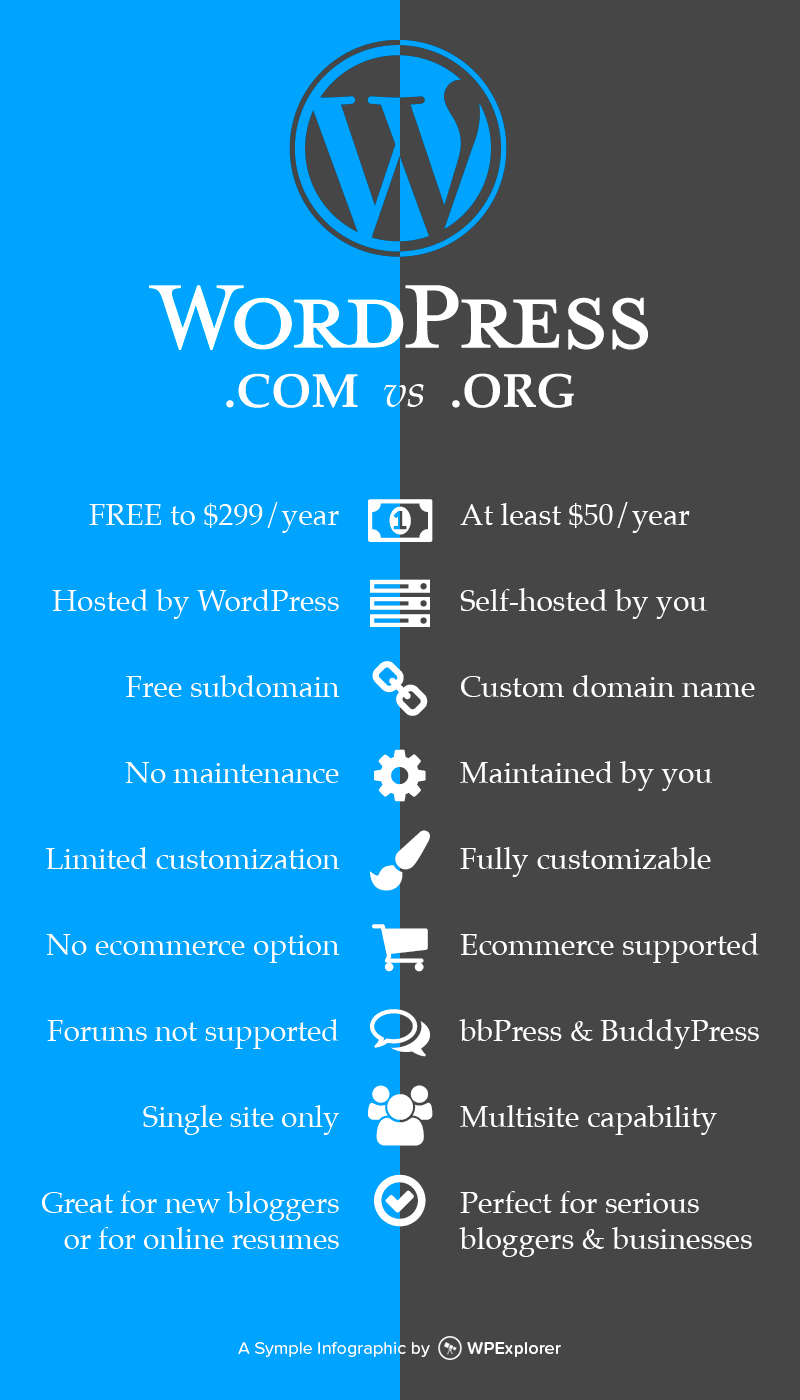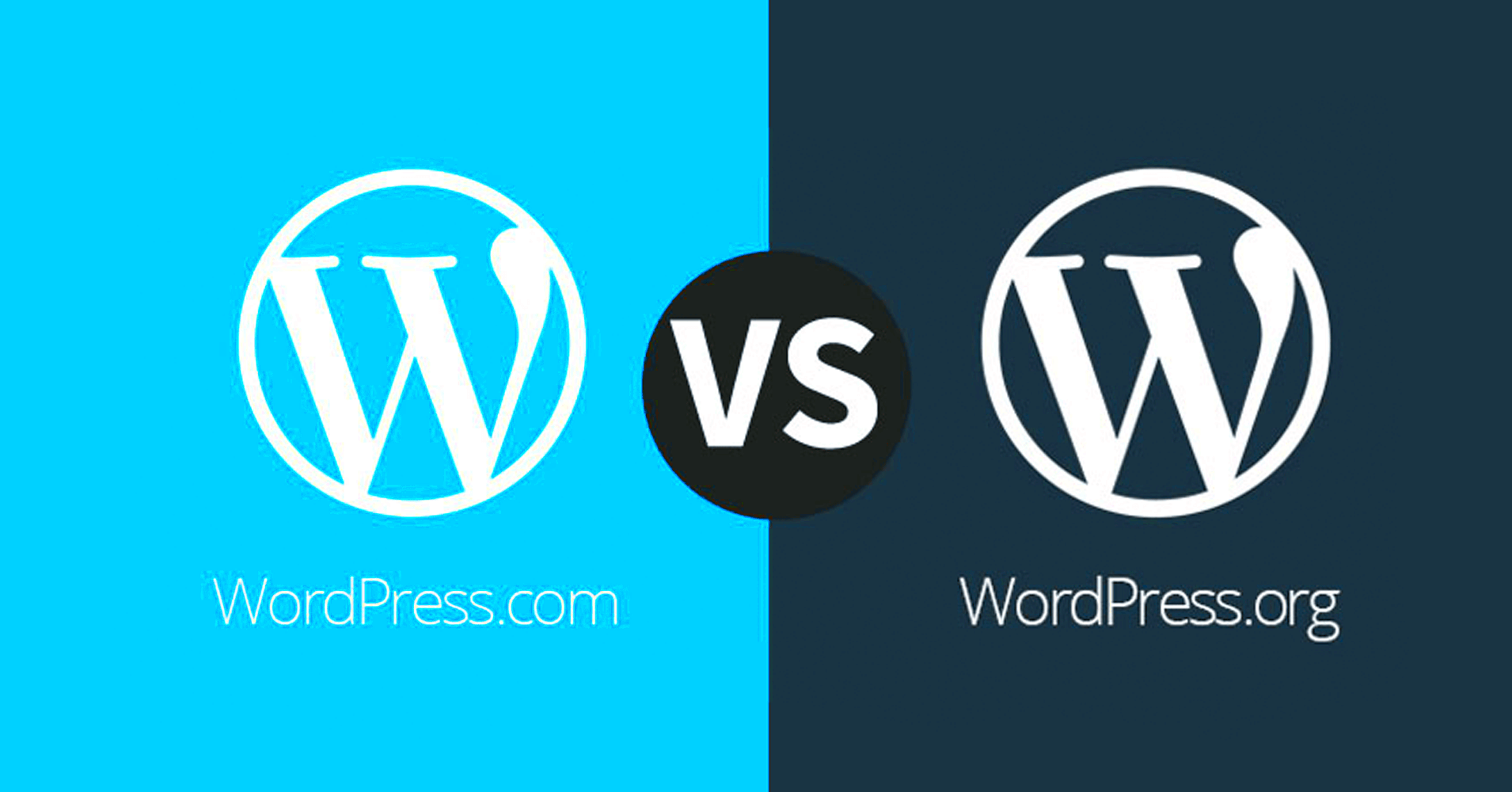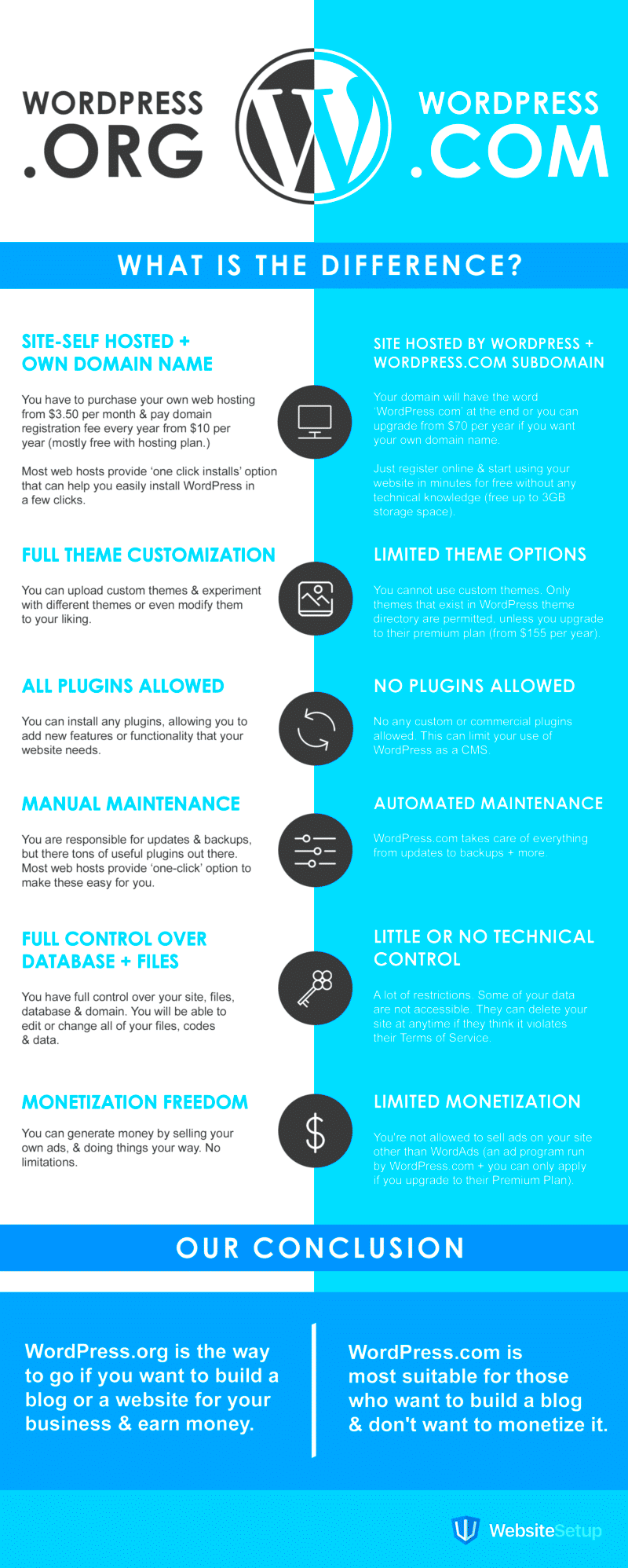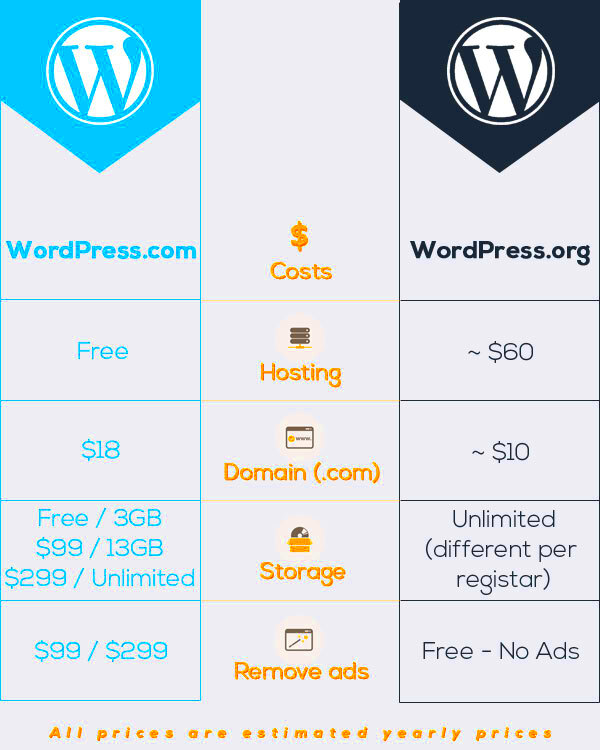WordPress is one of the most popular content management systems (CMS) out there today, powering over 40% of the web. Whether you’re a blogger, a small business owner, or just a creative soul wanting to share your ideas, WordPress provides a flexible platform that caters to various needs. But did you know there are two distinct versions of
Overview of WordPress.com

WordPress.com is a hosted service that allows users to create a blog or website without worrying about software installation or web hosting. Here’s a closer look at its features, benefits, and limitations:
- User-Friendly: WordPress.com is designed to be user-friendly. You don’t need any technical skills to set up your site—just sign up and start posting!
- Free and Paid Plans: You can get started for free with basic features. However, there are paid plans that offer additional benefits like custom domains and increased storage.
- Hosting Included: Since it’s a hosted platform, you don’t have to worry about finding a separate hosting provider.
- Limited Customization: While it’s easy to use, customizations are limited. You may not be able to install plugins or custom themes unless you opt for higher-tier plans.
- Automatic Updates: WordPress.com takes care of updates and security for you, which is a peace of mind for many users.
In summary, WordPress.com is perfect for those looking for an easy and hassle-free blogging experience without diving into technical details. However, if you’re after more customization and control, it might not fully meet your needs.
Overview of WordPress.org

If you’re venturing into the world of website creation, you’ve likely come across WordPress.org. But what is it exactly? Well, simply put, WordPress.org is a self-hosted version of the
- Self-Hosted: This means you need to find a web hosting provider. You can choose from various hosting services (like Bluehost, SiteGround, etc.) to host your site.
- Customization: You get complete freedom to customize your website. From themes and plugins to custom coding, the possibilities are endless. Want a unique design or a specific functionality? You can achieve it!
- Ownership: Unlike its .com counterpart, with WordPress.org, you own your content. There are no restrictions on what you can post, and you won’t have to worry about ads or losing your site.
- No Limits: You don’t have limitations on storage, bandwidth, or monetization. If your site takes off, you can grow it as big as you want without running into issues.
In essence, WordPress.org is perfect for those who want a professional-looking site or blog with the freedom to customize it to their heart’s content. Just keep in mind, it comes with the responsibility of managing everything yourself—updates, backups, security, and so on.
Key Differences Between WordPress.com and WordPress.org

While both WordPress.com and WordPress.org share the same foundational software, they’re designed for different types of users and needs. Understanding these differences is essential for making the right choice for your website. Here’s a breakdown of the key distinctions:
| Feature | WordPress.com | WordPress.org |
|---|---|---|
| Hosting | WordPress.com manages hosting for you. | You need to find your own hosting provider. |
| Customization | Limited customization options; you can only use the themes and plugins available. | Full control over customization with thousands of themes and plugins. |
| Monetization | Ads are displayed on your site unless you pay for an upgrade. | You can monetize freely—run ads, sell products, and more! |
| Content Ownership | You don’t own your content; it’s hosted on WordPress’s servers. | You have complete ownership of your content. |
| Cost | Free basic plan, but many features require a paid upgrade. | Free software, but you pay for hosting and potentially additional services. |
So, in a nutshell, choose WordPress.com if you want convenience and don’t mind some limitations. On the other hand, go with WordPress.org if you’re looking for full control and the ability to expand your website as you grow. Knowing these differences will definitely help streamline your decision-making process!
5. Ease of Use
When it comes to ease of use, WordPress.com and WordPress.org cater to different types of users, and understanding these distinctions can help you choose the right platform for your needs.
WordPress.com: This platform is designed with beginners in mind. Its interface is intuitive and straightforward, allowing users to get a site up and running in minutes. You don’t need to worry about hosting or technicalities. Here are some key points:
- Pre-defined templates and themes
- Built-in hosting and security measures
- Automatic updates for plugins and themes
- User-friendly dashboard for easy management
However, this simplicity comes with limitations. You won’t have as much control over your site’s design and functionality, which might be a downside if you’re looking for a tailored experience.
WordPress.org: On the other hand, WordPress.org offers a more complex but powerful environment. Here, users need to handle the hosting and installation themselves, making it less suited for complete beginners. Nevertheless, it provides more flexibility once you get the hang of it. Consider these aspects:
- Full control over your website
- Ability to install custom themes and plugins
- Greater scalability for growing businesses
- Advanced SEO capabilities
In essence, if you’re looking for a straightforward way to create a blog or a simple website, WordPress.com may be your best bet. However, if you crave deeper control and customization in the long run, investing some time in learning WordPress.org is worth it.
6. Customization Options
Customization is where the two platforms really start to diverge, and understanding these differences is crucial for anyone who wants to create a unique or professionally tailored website.
WordPress.com: While WordPress.com does provide some customization options, they are relatively limited compared to WordPress.org. Here’s what you can expect:
- Access to a selection of themes (upgradable with paid plans)
- Restricted plugin options (only available on Business plans)
- Basic CSS customization for premium users
- Limited control over code and third-party integrations
This means that while you can still create a visually pleasing website, the customization won’t be as deep or versatile. If you’re okay with a more templated approach, then you might find this acceptable.
WordPress.org: In contrast, WordPress.org is a paradise for those who love to customize. Reasonably, it is often favored by web developers and designers for a good reason:
- Access to thousands of themes and plugins for functionality
- Ability to upload and modify custom themes and plugins
- Full control over HTML, CSS, and PHP coding
- Extensive options for SEO and performance optimization
This level of customization means you can create anything from a simple blog to a complex e-commerce website or portfolio. The flexibility and the near-limitless choices make WordPress.org a go-to for those serious about their online presence.
Ultimately, your choice comes down to how much control you want over your site. If you’re after flexibility and extensive customization, WordPress.org takes the cake. But if you prefer a simpler, hands-off approach, WordPress.com may serve you just fine.
7. Cost Comparison
When considering the differences between WordPress.com and WordPress.org, one of the most significant factors to evaluate is cost. Each platform has its pricing structure, which can impact your decision based on your budget and needs.
WordPress.com offers a range of plans, starting with a free option that has limited features and includes WordPress ads. As you move up to the paid plans, the costs can range from around $4 per month for the Personal plan (which removes ads and allows you to use your domain) to $45 per month for the eCommerce plan that provides the most robust features. Here’s a breakdown of the common WordPress.com plans:
| Plan | Price (per month) | Key Features |
|---|---|---|
| Free | $0 | Basic features, WordPress ads, limited customization |
| Personal | $4 | Custom domain, remove ads, email support |
| Premium | $8 | Advanced customization, monetization options, Google Analytics |
| Business | $25 | Plugins and themes, SEO tools, site backups |
| eCommerce | $45 | Full-fledged online store features, payment processing |
On the other hand, WordPress.org is free to use, but you will need to pay for hosting and domain registration. Hosting costs can range from as low as $3 to upwards of $30 per month, depending on the provider you choose. Additionally, premium themes and plugins may come with one-time fees or subscription costs.
Essentially, while WordPress.com can appear more straightforward with its tiered plans, WordPress.org might be more cost-effective in the long run if you’re planning to customize your site extensively or run a business. Choosing between the two really boils down to your specific needs, budget, and how much control you want over your website.
8. Hosting Solutions
Hosting solutions are another area where WordPress.com and WordPress.org diverge significantly. Understanding how each platform handles hosting can help you choose the right one for your website.
WordPress.com takes care of all the hosting for you. This means you don’t have to worry about buying hosting separately or managing server settings. The hosting is included in the plans offered, which makes it super convenient for beginners who just want to get started without delving into the technical aspects of website management. That said, the flexibility in choosing your hosting environment is greatly limited, especially at the lower-tier plans.
With WordPress.org, you’re in the driver’s seat! You can choose from a plethora of hosting providers, such as Bluehost, SiteGround, or WP Engine. This option allows you to select a hosting plan that fits your needs in terms of pricing, performance, and features. Here are some common hosting options:
- Shared Hosting: Affordable and perfect for beginners. Sites share server resources, which can affect speed during high traffic.
- VPS Hosting: More resources and better performance than shared hosting. A step-up for growing sites.
- Dedicated Hosting: Full server resources for your site. This option is aimed at large websites that require peak performance.
- Managed WordPress Hosting: Tailored specifically for WordPress sites with automatic updates, backups, and security features, although it typically comes at a higher cost.
Ultimately, the hosting solution you choose depends on your technical skills, traffic expectations, and budget. If having complete control over your hosting and setup is important to you, then WordPress.org is the way to go. However, if you prefer a hands-off approach, WordPress.com’s hosted solution might be more appealing.
Support and Community
When it comes to managing a website, having access to reliable support and a vibrant community can make all the difference. Between WordPress.com and WordPress.org, there are notable differences in the availability and types of support you can expect.
WordPress.com offers built-in support for its users, mainly through its comprehensive help section, documentation, and customer service teams. If you’re on a paid plan, you can also access live chat and email support. The advantage here is that if you run into any issues while using your site, you have a team at your disposal to assist. Plus, since WordPress.com handles all updates and security, you can focus more on creating content.
In contrast, WordPress.org truly thrives on community support. Since it’s open-source software, you’ll find a wealth of resources online, such as forums, blogs, and tutorial websites dedicated to helping users. Key support avenues include:
- Support Forums: Users can ask questions and get responses from experienced community members.
- Documentation: A vast repository of guides and tutorials is available to help you with everything from installation to advanced customization.
- Online Communities: There are countless Facebook groups, Reddit channels, and Discord servers for WordPress.org users where you can share experiences and seek advice.
Overall, if you prefer direct customer support, WordPress.com may be the way to go. On the other hand, if you enjoy learning from peers and solving problems collaboratively, WordPress.org’s community-driven support might be more appealing.
Which Platform Is Right for You?
The decision between WordPress.com and WordPress.org boils down to your specific needs, technical skills, and long-term goals. Let’s break it down to help you choose the platform that best fits your objectives.
If you need a simple and straightforward setup, WordPress.com could be your best bet. It’s perfect for personal bloggers or those who want to get online quickly without much fuss. With its all-inclusive plans, you don’t need to worry about hosting, backups, or security. You’re free to concentrate on what matters most—creating great content.
However, if you’re looking for more control, flexibility, and customization, then WordPress.org is the way to go. This platform allows you to:
- Install Plugins: Extend the functionality of your site with thousands of plugins.
- Use Custom Themes: Choose from a world of themes to perfectly match your brand or style.
- Full Control: From SEO settings to eCommerce capabilities, you have total control over your website.
Ultimately, consider your current skills, the kind of website you want to build, and your long-term goals. If you want a low-maintenance solution, stick with WordPress.com. But if you’re ready to roll up your sleeves and dive deeper into web development, go for WordPress.org. Your choice will set the stage for your online journey!
Conclusion
Understanding the differences between WordPress.com and WordPress.org is essential for making an informed choice about your website. Each platform serves unique needs and preferences, catering to different user types.
WordPress.com is a hosted solution, handling the technical aspects for you, making it ideal for beginners or those who prefer a more hands-off approach. On the other hand, WordPress.org offers greater flexibility and control, making it the preferred choice for advanced users or businesses that require custom solutions.
Here’s a quick summary of their key differences:
| Feature | WordPress.com | WordPress.org |
|---|---|---|
| Hosting | Hosted by WordPress | Self-hosted |
| Customization | Limited themes and plugins | Unlimited themes and plugins |
| Cost | Free and paid plans | Free software, but requires hosting |
| Monetization | Limited options | Full control over monetization |
| Maintenance | Managed by WordPress | User responsible for maintenance |
In summary, choose WordPress.com for simplicity and ease or opt for WordPress.org for full control and customization of your site.



